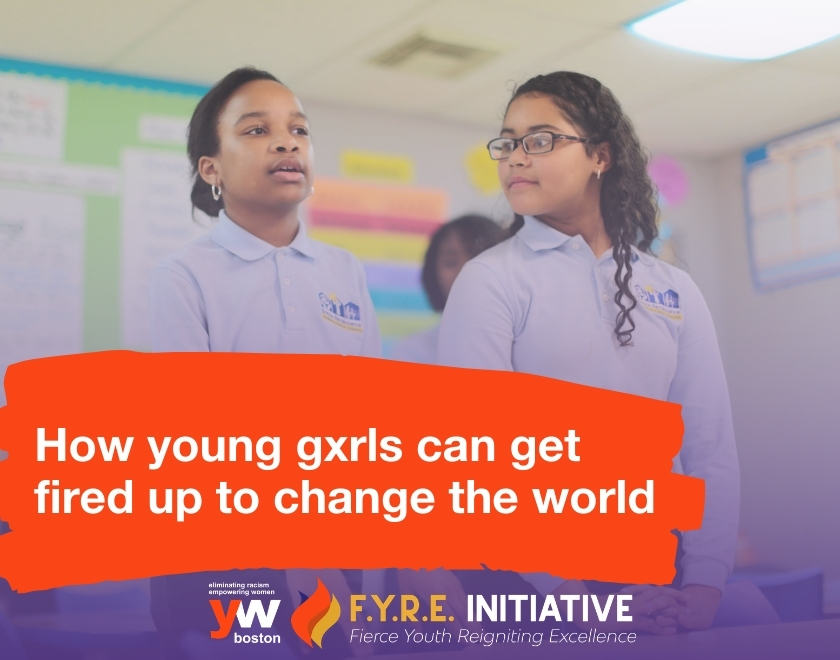
January 25, 2021
How young gxrls can get fired up to change the world
Note: Throughout this article, we use the terms “womxn” and “gxrl” as terms to include anyone, including transgender, non-binary, genderfluid, polygender, and gender non-conforming people, whose key gender identity, experience, and internal perception on the spectrum of gender is woman or girl.
We all have a responsibility to work to better our communities. Advocacy is one of the most effective ways to make change, because it works to address the policies and practices that affect our daily lives. However, many people don’t see the ways they can intervene and make the change they want to see. By helping youth to understand themselves as advocates, we can empower generations to learn the language and tools of advocacy to make change throughout their lifetimes.
We spoke with Caiana Luse, our F.Y.R.E. Initiative Program Coordinator, who shared why advocacy is such a crucial aspect of the program curriculum. As she explains it, learning about advocacy helps young gxrls recognize the power they hold within their community and develop the skills they need to make change. Learn more about how young gxrls can get fired up to change the world, with examples from the F.Y.R.E. Initiative curriculum:
Energizing youth who haven’t thought of themselves as advocates
Young gxrls, especially Black and Indigenous young gxrls of color, exist at the intersection of identities that have been historically undervalued by American society. Their experiences with racism, sexism, classism, ageism, and other systems of oppression try to inform young gxrls’ opinion of their own power and advocacy. Caiana Luse explained that most of the gxrls enter the F.Y.R.E. Initiative feeling like they don’t have power to make change. They express the belief that the world was created to work against them. Oftentimes, in school, they find that their opinions aren’t valued, especially when strict policies and practices make them feel devalued. These policies can range from poor nutritional options to not having access to menstrual products at school.
To contrast these harsh experiences, oftentimes youth need to be told that they have permission to feel the way that they do. The F.Y.R.E. Initiative facilitators stress the fact that the gxrls’ feelings of trauma and guilt are not new and that they are natural, and they explain that they’ve been through many of their same experiences. When the group discusses manifestations of oppression, such as sexism or racism, they realize they have overlapping experiences and begin to understand the systems their experiences are rooted within.
One of the keys to understanding their own power is for gxrls to access what they value. The F.Y.R.E. Initiative team asks Igniters early in their program “What are you bringing to the bonfyre?” Igniters talk about their interest in music or art, how they are good listeners, how they’ll always bring candy to the conversations. In working as a group, the gxrls learn about themselves, each other, and begin to see the parallels between their group’s experiences and values.
Through the first section of the F.Y.R.E. Initiative lessons on identity and personal power, students often come to find they have more power than they thought. As Caiana explained, self-confidence is key to empowering young gxrls’ advocacy, because if one doesn’t see their own value, they will be unable to recognize their ability to make change.
Finding agency through an expanded definition of advocacy
To many young gxrls, advocacy can seem like a huge, daunting initiative to undertake. To those who haven’t participated in advocacy before, or who didn’t know their former actions were advocacy, the idea can feel ethereal. The F.Y.R.E. Initiative helps Igniters see that advocacy is much simpler than they thought. For instance, YWCA USA defines advocacy as “Work done on behalf of those most negatively affected by a specific policy or practice.” This work can range from political advocacy to awareness building to a conversation with a friend, and everything in between.
The Igniters create a definition of advocacy for themselves to ground their work. “Strength” and “power” are two words that come up often. They also ask the students why they feel uncomfortable advocating for themselves. The most common answers revolve around their fear of losing something, such as a relationship or a material good. Empowering young gxrls to take part in advocacy hinges on helping them move from fear to strength by centering confidence, self-value, and community. And by creating their own definition of advocacy, young gxrls can feel more grounded in the actions they can take.
Identifying an issue and how to address it
Once they’ve settled on an understanding of advocacy, the Igniters learn about three crucial aspects of advocacy: community assessment, root cause analysis, and power analysis. By taking part in a community analysis, they assess aspects of their own identity that they have a vision to change. After identifying an issue area, they perform a root cause analysis by interrogating the “Why” of the policy or practice they want to address. A root cause analysis helps young gxrls understand the actors in their community and why they make the decisions that affect those around them.
Next, the Igniters perform a power analysis in order to identify people within their community who have power related to their issue area. They may be people the gxrls know or do not know. The goal of the exercise is to determine who they can ask to help as their allies, who may be less likely to listen to their advocacy, and who are the decision makers that hold power over their issue area. This helps the Igniters make efficient use of their advocacy and increase their impact.
Here’s an example of how one Igniter cohort moved through these steps.
The gxrls in the group recognized their shared dissatisfaction with the nutritional options offered at their cafeteria. The food wasn’t as healthy as they wished, and there were rarely vegan or dairy-free options. They began to ask ‘why’ their school chose this food, and kept digging deeper with their interrogations — Why aren’t there more options Why did the school contract with one supplier? Why was that supplier cheaper? Following their questioning, they identified who in the school made nutritional decisions and who they could ally with. When it came to addressing the issue, the group chose to act in three ways: writing a series of poems about how they feel about their school’s nutrition, circulating a petition for more options, and writing a letter to their principal.
Caiana explained that the Igniters get most fired up when they officially decide on their course of action. After doing the groundwork, they are ready to dive in.
Taking ownership over one’s community and inspiring others
Encouraging youth to take part in advocacy helps build a world in which we all have a sense community responsibility. When young gxrls don’t feel that they have power over their own lives, they also reject the idea of ‘owning’ their community. But in becoming advocates for themselves, they also become empowered to advocate for those whose voices are not heard. Through the F.Y.R.E. Initiative, Igniters learn to see how their environment impacts them and how they can impact their environment. They will begin to feel a sense of community responsibility wherever they go – in their neighborhood, at school, or at work.
By learning about advocacy, youth also have the opportunity to educate others. The F.Y.R.E. Initiative engages students for one semester, but by working to institute their community action project and operationalizing these tools and values, the gxrls develop the skills they need to organize actions following the program. By feeling empowered themselves, they will in turn empower others, too.
Want to learn about our Igniters’ community action projects? Be on the lookout for information about attending our F.Y.R.E. Symposium in late spring.
______


About YW Boston’s F.Y.R.E. Initiative
With the F.Y.R.E. Initiative, launched in the Fall of 2019, YW Boston facilitators conduct a 12-15-week leadership development series for girls grades 6th through 9th. The series brings together social justice education, positive identity development, and civic engagement, culminating in small group civics projects. This model takes place in schools or Out of School Time programs, and it is developed to operate in a “girls group” structure rather than a traditional classroom structure. Core to the program is an effort to provide experiential learning opportunities and dialogue to build understanding and increase social-emotional learning.

